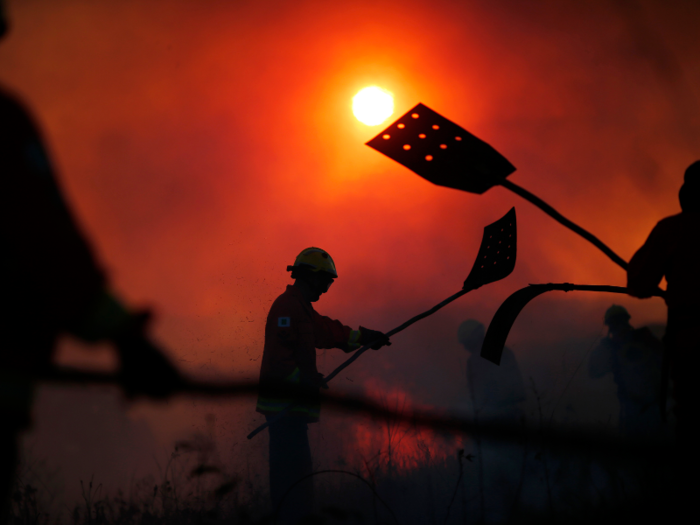
Stepping outside on a July or August day can feel like a physical blow. The longer you spend in the heat, the more serious the effects on your body can be.
First, increased body temperature can start to cause heavy sweating, clammy skin, dehydration, tiredness, headache, dizziness, nausea, cramps, and a quick, weak pulse.
Someone in this state should move to cool place, sip water, and take a cool bath or put cool wet cloths on their body. If these symptoms last longer than an hour, worsen, or if a person is vomiting, then they need medical help, according to the CDC.

Once body temperature rises to 103 Farenheit or higher, a person starts to suffer from heat stroke, which can be a fatal medical emergency.
Symptoms of this include many of the signs of heat exhaustion, though a person with heat stroke may have a fast, strong pulse; feel confusion; and may be losing consciousness. They also may stop sweating.
People suffering from heat stroke need to be cooled immediately. In that situation, don't give a person anything to drink. Move them to a cool place, put cool cloths on them or put them in a cool bath, and call 911.

If you've ever felt like the heat puts your brain into a fog — a sensation like that in a steam room, where it's hard to breathe, much less think clearly — you're not alone.
A number of studies show that as temperatures climb, we perform more slowly and more inaccurately on cognitive tests. This phenomenon affects everyone from students taking standardized tests to office workers trying to get through the day.

Ever noticed how you see more air quality alert days in the summer? Get ready for more.
On hot days, heat from the sun causes pollutants to react with atmospheric gases to form ozone. The hotter it is, the more ozone pollution is produced. Plus, still air on hot days causes smog to stick around.
One 2008 study found that for every degree Celsius the temperature rises, ozone pollution can be expected to kill an additional 22,000 people around the world via respiratory illness, asthma, and emphysema.
Non-ozone air pollution linked to warmer weather will also increase rates of lung cancer, allergies and asthma, and cardiovascular disease.
A 2017 study found that air pollution already kills 9 million people every year. So as temperature increases, that death toll will rise.

A study published this month in the journal Nature Climate Change reported that a 1-degree-Celsius rise in average monthly temperature was associated with an increase in the monthly suicide rate. In the US, that increase was about .7%, and in Mexico it was 2%.
By 2050, the study authors concluded, this will likely lead to 14,000 additional suicides in the US, though they say there could be as many as 26,050 more.

Many of us might associate the transition from winter to summer with a positive mood, but it seems the heat can wear us down over time.
The authors of that same study on the link between climate and suicide also analyzed more than 600 million tweets, and found that people were more likely to express depressive feelings as temperatures rose.

When spring arrives every year, allergy sufferers feel it in their noses, throats, sinuses, eyes, and more. Spring pollen season now begins earlier in the year, and the growing season for allergenic pollen like ragweed has gotten longer.
More carbon dioxide in the air also increases pollen levels.
All of this leads to more sneezing and sniffling for for allergy sufferers — and these allergy symptoms can also make dangerous asthma attacks more frequent.

A study published last year in the journal Nature Climate Change found that 30% of the world is already exposed to heat that's intense enough to kill people for 20 or more days each year. That level of intensity is defined using a heat index that takes into account temperature and humidity; above 104 degrees Farenheit (40 degrees C ), organs swell and cells start to break down.
In 2010, more than 10,000 people did in a Moscow heat wave. In 2003, some estimates say a European summer heat wave killed up to 70,000.
 I quit McKinsey after 1.5 years. I was making over $200k but my mental health was shattered.
I quit McKinsey after 1.5 years. I was making over $200k but my mental health was shattered. Some Tesla factory workers realized they were laid off when security scanned their badges and sent them back on shuttles, sources say
Some Tesla factory workers realized they were laid off when security scanned their badges and sent them back on shuttles, sources say I tutor the children of some of Dubai's richest people. One of them paid me $3,000 to do his homework.
I tutor the children of some of Dubai's richest people. One of them paid me $3,000 to do his homework. Why are so many elite coaches moving to Western countries?
Why are so many elite coaches moving to Western countries?
 Global GDP to face a 19% decline by 2050 due to climate change, study projects
Global GDP to face a 19% decline by 2050 due to climate change, study projects
 5 things to keep in mind before taking a personal loan
5 things to keep in mind before taking a personal loan

Copyright © 2024. Times Internet Limited. All rights reserved.For reprint rights. Times Syndication Service.